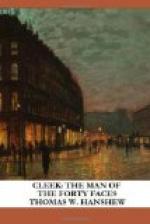Bucarelli and his wife gave a mingled cry, and, chained together though they were, made a wild bolt for the door; only, however, to be met on the threshold by the local constable, to whom Cleek had dispatched a note some hours previously.
“Thank you, Mr. Philpotts; you are very prompt,” he said. “There are your prisoners nicely trussed and waiting for you. Take them away—we are quite done with them here. Sir Henry”—he turned to the baronet—“if Black Riot is fitted to win the Derby she will win it, and you need have no more fear for her safety. No one has ever for one moment tried to get at her. You yourself were the one that precious pair were after, and the bait was your life assurance. By killing off the watchers over Black Riot one by one they knew that there would come a time when, being able to get no one else to take the risk of guarding the horse and sleeping on that bed before the steel-room door, you would do it yourself; and when that time came they would have had you.”
“But how? By what means?”
“By one of the most diabolical imaginable. Among the reptiles of Patagonia, Sir Henry, there is one—a species of black adder, known in the country as the Mynga Worm—whose bite is more deadly than that of the rattler or the copperhead, and as rapid in its action as prussic acid itself. It has, too, a great velocity of movement and a peculiar power of springing and hurling itself upon its prey. The Patagonians are a barbarous people in the main and, like all barbarous people, are vengeful, cunning, and subtle. A favourite revenge of theirs upon unsuspecting enemies is to get within touch of them and secretly to smear a mixture of coriander and oil of sassafras upon some part of their bodies, and then either to lure or drive them into the forest; for by a peculiar arrangement of Mother Nature this mixture has a fascination, a maddening effect upon the Mynga Worm—just as a red rag has on a bull—and, enraged by the scent, it finds the spot smeared with it and delivers its deadly bite.”
“Good heaven! How horrible! And you mean to tell me—”
“That they employed one of these deadly reptiles in this case? Yes, Sir Henry. I suspected it the very moment I smelt the odour of the coriander and sassafras; but I suspected that an animal or a reptile of some kind was at the bottom of the mystery at a prior period. That is why I wanted the flour. Look! Do you see where I sifted it over this spot near the Patagonian plant? And do you see those serpentine tracks through the middle of it? The Mynga Worm is there—in that box, at the roots of that plant. Now see!”
He caught up a horse blanket, spread it on the floor, lifted the box and plant, set them down in the middle of it, and with a quick gathering up of the ends of the blanket converted it into a bag and tied it round with a hitching strap.
“Get spades, forks, anything, and dig a hole outside in the paddock,” he went on. “A deep hole—a yard deep at the least—then get some straw, some paraffin, turpentine—anything that will burn furiously and quickly—and we will soon finish the little beast.”




